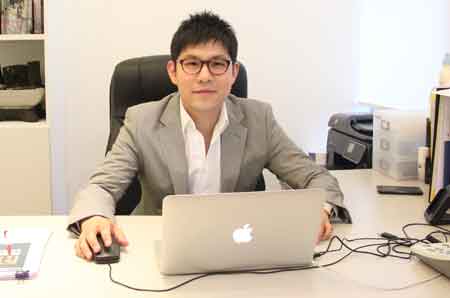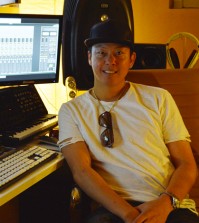- California Assembly OKs highest minimum wage in nation
- S. Korea unveils first graphic cigarette warnings
- US joins with South Korea, Japan in bid to deter North Korea
- LPGA golfer Chun In-gee finally back in action
- S. Korea won’t be top seed in final World Cup qualification round
- US men’s soccer misses 2nd straight Olympics
- US back on track in qualifying with 4-0 win over Guatemala
- High-intensity workout injuries spawn cottage industry
- CDC expands range of Zika mosquitoes into parts of Northeast
- Who knew? ‘The Walking Dead’ is helping families connect
Localizing K-pop
Indonesian boy band S4 captures Korean looks, feel

Indonesian boy group S4 was trained under the K-pop grooming system for a year at the Rainbowbridge Agency prior to its debut. The group has been
nominated for four World Music Awards.
(Courtesy of Rainbowbridge Agency)
By Park Jin-hai
Indonesian boy band S4 ― comprised of “sexy” Firly, “sweet” Jeje, “sentimental” Arthur and “smart” Alif ― evokes images of Korean pop-stars.
Their outfits, hairstyles and hand gestures, as well as the symmetric and spacious background settings in their music video are similar to those of 2PM. Their song resembles the hook-heavy dance songs of Korean acts.
The fact is that the four-member group, winners of the Korea-Indonesia audition project “Galaxy SuperStar Season I,” received yearlong training in Korea before their debut in October 2012.
Their title song, “She Is My Girl,” was composed by K-pop song hit-maker Kim Do-hoon, who composed songs for Korean idols like 2AM, G.NA and Davichi.
Hyun-a, Korean female singer famous for her appearance in Psy’s “Gangnam Style” music video, was featured in the rapping part of the song. The group’s “Like Me” is a remake of the 2PM song.
At a time when the local K-pop market has become saturated with in-kind K-pop idols and the competition has gotten more intense, local entertainment agencies find the overseas music market increasingly attractive. The size of the global music industry should have passed the $50-billion mark in sales in 2013, according to estimates.
Since 2011, local entertainment agencies, including CJ E&M, Cube Entertainment and Rainbowbridge Agency, have tried to export their K-pop incubating systems, with some establishing sister training branches in targeted markets.
Cube Entertainment trained a Chinese band, M4M, for four years before its debut, while CJ E&M opened a talent-training center, M Studio, last year in Beijing.
“We, along with eight other finalists of the audition program, came to Korea. In my country, the star training system is not as systemized as the one in Korea,” said Alif, the leader of S4.
The personal training, tailored to draw out the potential of each member, is one of the biggest benefits of the K-pop training system, S4’s Arthur said.
“Learning well-choreographed group dances was the hardest part, since we haven’t done it before. And the diet program that accompanied the training was also a challenge,” Alif added.
He said he started dreaming about becoming an internationally renowned artist by looking at famous Korean singers like Super Junior and Big Bang.
The joint-venture musical group has been an instant success. It topped local music charts within three weeks after its debut. It also has been nominated in four of the nine categories ― World’s Best Song, World’s Best Group, World’s Best Video and World’s Best Live Act ― at the World Music Awards (WMA).
It is quite a feat, given that K-pop sensation ― Psy is nominated in seven categories; 2NE1 and Big Band in four; and Girls’ Generation, Kara and 2PM in two.
The Awards are televised in some 160 countries each year. Former winners included Lady Gaga for Best-selling New Artist and U2 for Best-selling Rock Act.
Kim Jin-woo, CEO of Rainbowbridge Agency, said S4’s success signals K-pop has reach another level.
“If the first generation of hallyu was about performing and selling albums overseas, the second generation is about bringing in foreign talent to give birth to globalised musical acts, like Thailand-born Nichkhun from 2PM and girl band f(x)’s Chinese member Victoria,” said Kim, who trained S4 in collaboration with Indonesia-based YS Entertainment.
“Localization of the K-pop training system ― grooming foreign artists with the K-pop training system and working for their rights ― is the way to go. I thought it could be a way to extend the life of the ongoing popularity of Korean pop music.”
His agency also trained Indonesian girl band S.O.S and Chinese girl band Seven Sense.
Kim predicted that in the future, fans will transfer from K-pop idols to local idols produced by the K-pop training system, given that in some Asian countries the popularity of K-pop quickly cools down due to tricky political situations.
He closed a deal to air another audition program in March in Vietnam, and is currently in talks with related parties in Thailand. “Nurturing the next S4 and S.O.S is what I dream of. I believe that is my way of spreading Korean music and culture.”













![일본 사도광산 [서경덕 교수 제공. 재판매 및 DB 금지]](http://www.koreatimesus.com/wp-content/uploads/2024/07/PYH2024072610800050400_P4-copy-120x134.jpg)


